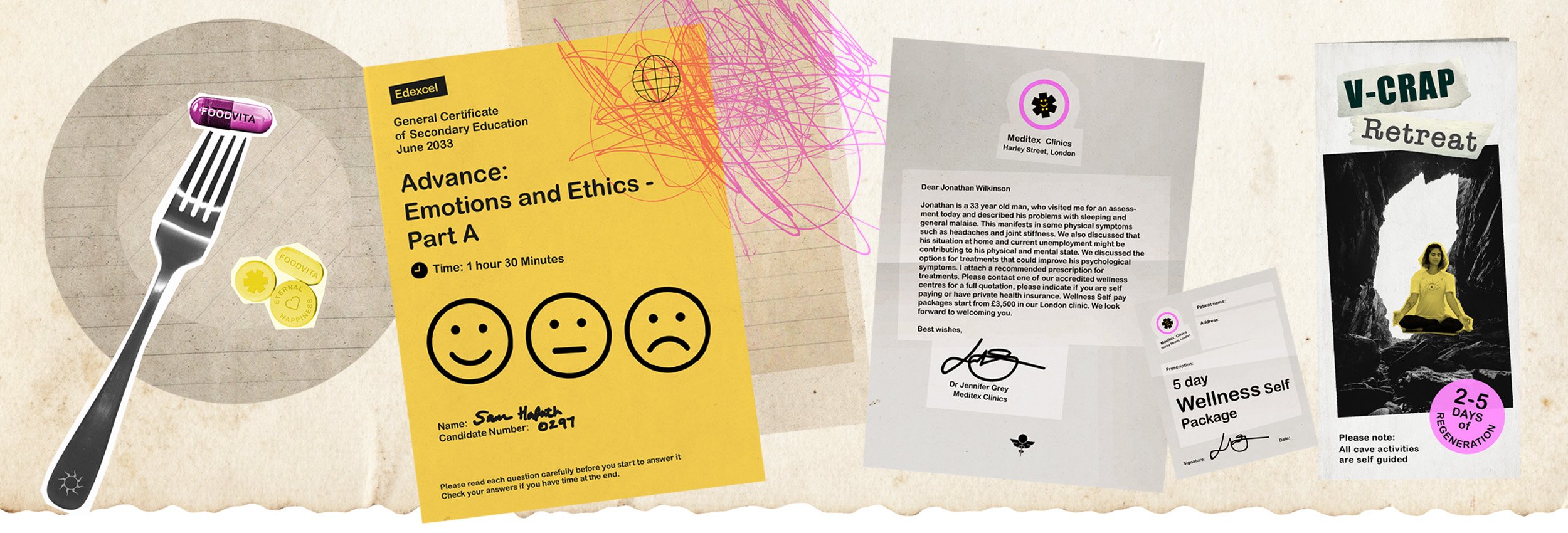Possible, Plausible and Just Futures for Civil Society
Introduction | Future One | Future Two | Future Three | Observations & Conclusions

Future two: Infrastructure for social repair
Exploring the role of spirituality and wisdom in building personal and social resilience
Recurring concerns: inflexibility; denial; fragility; fear of hidden societal horrors emerging/being exposed; securitisation; carceral and punitive justice
Recurring hopes: lifelong learning; educational reform; belonging; resilience; regeneration; preservation; justice; restoration
What is repair?
This refers to social and emotional repair as well as physical maintenance. The participants identified social repair as the ability of a system, community or society exposed to hazards to adapt and transform. The capacity for social repair depends on every member of a society having regenerative capacity, developed through education and the normalisation of spiritual practice.

Foodvita offers a nutritionally complete meal in a pill. 3-4 pills are recommended each day depending on your activity level.
Spirituality
The participants considered spirituality as the manifestation of a common practice both within and beyond formally recognised religious beliefs. This might include New Age, indigenous, technocratic, and/or more-than-human practises, or the formation of localised groups based on shared belief systems, such as gangs.
Spirituality was framed as a form of uncommon norms leading to the formation of groups, commitments, energies, and common practises. Common value systems and the necessary evolution of social contract were considered as part of this, including mechanisms for judgement on “good” and “evil”, punishment and forgiveness.

Edexcel
General Certificate of Secondary Education
June 2033
Advance: Emotions and Ethics - Part A
Time: 1 hour 30 Minutes
Please read each question carefully before you start to answer it
Check your answers if you have time at the end.
“Willington High Independent School – Excelling through uncertainty.
Willington High welcomes students into a vibrant and supportive teaching environment, one where students are encouraged to learn new forms of emotional intelligence through our bespoke curriculum. We teach students to be the best and most resilient version of themselves through our curriculum which is designed around the acceptance of fear, uncertainty and the principle of connection. Our novel programme allows children to express themselves in new ways and achieve their full potential in life. In the academic year 2025 we are accepting students with outstanding academic potential through our scholarship schemes, alongside fee paying students.”
By 2026 the commercialization of emotional connections begins to occur. It develops into a $1.5 billion dollar market.
The intervention:
A lifelong spiritual education
In the alternative universe of 2036, education is no longer just for children and the curriculum has evolved to cover social and emotional subjects, including connection, fear, imagination, and what it means to be human — and more- than human. There is a module (optional or mandatory, to be discussed) in which adult pupils spend two months in isolation in a cave, to attend to their spiritual growth. This might be part of a nationally funded gap year scheme.
Education was chosen as the focus of the intervention because it would enable ongoing change, and the normalisation of spiritual isolation would create an opportunity for everyone to more deeply understand their personal energies, emotions and relationships. This is a re-conception of education as a path to wisdom; rather than learning facts, its focus is on creating emotionally intelligent minds.

Welcome to the Voluntary Cave Retreat Associations’ Programme (V-CRAP)
This programme has now replaced the Citizen Service Programme, and is offered to all uk citizens at the age of 32. The programme offers a 2-5 day retreat in caves based in a variant of UK locations. The following programme gives you an idea of the recommended activities during your retreat:
Yoga (flow) 7-8am
Meditation 8-9am
Breakfast (Foodvita pill recommended) 9am
Reading 10-11am
Short walk 11-12pm
Lunch (Foodvita) 12pm
Breathwork 12-1pm
Meditation 1-4pm
Yoga (hatha) 4-5pm
Dinner (Foodvita) 5pm
Relaxation 5-7pm
Sleep
Please note: these activities are self guided and the retreat is spent in isolation, this programme of activities is a recommendation of how best to spend your time during your cave stay.
Participants explored some potential unintended consequences, such as:
A potentially negative impact on existing infrastructure: the dominance of spiritual education could lead to the de-prioritisation of more rational subjects; for instance, maths might be cut from the curriculum to make space for hope.
New harms may emerge, due to an increased range of human expression and lack of guidance: for instance, educators may turn into cult leaders; caves might be damaged due to frustration.
Positive impacts on mental and physical health: by shifting the curriculum to focus more on energies and emotions and with the sabbatical spent in the cave, people would learn to better care for their mental and physical health. Also, by being able to better care for and understand themselves, people could develop better skills for relating to one another and solving conflict in more constructive ways.
Impacts beyond education settings: for instance, new settlements and relationships may develop in and between cave spaces; some people might choose to retreat from society; people with caring responsibilities would require alternative care infrastructures to support their retreat.
Next: Future Three >
Possible, Plausible and Just Futures for Civil Society


